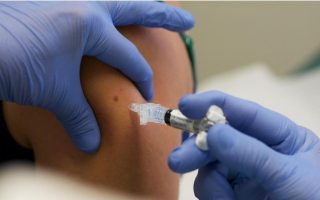Antimicrobial resistance spreading fear
Antibiotic abuse has created superbugs that even the latest generation of drugs cannot cope with

The European Center for Disease Prevention and Control’s (ECDC) awareness campaign gets under way on Saturday as part of World Antibiotic Awareness Week (November 18-24) amid growing concern over the proliferation of strains of bacteria, viruses, parasites and fungi for which there are virtually no active antibiotics available. These so-called superbugs cause more than 700,000 deaths worldwide every year.
Experts note the main reason is that the antibiotics administered to treat an infection are meant to kill the microbes that cause it. But they don’t just kill them, they also kill those that are sensitive to the antibiotic, including many of the “good microbes” that our bodies need.
On the other hand, they cannot kill those that carry the genetic information that makes them resistant to its action. This information is passed on by those that survive to other microbes and so resistance to antibiotics, antimicrobial resistance, spreads.
Therefore, every time we take an antibiotic, whether for legitimate reasons or not, we help to breed microorganisms that are increasingly resistant, which increases the threat to public health.
The figures from the ECDC are disheartening. In 2020 alone, antibiotic-resistant infections (hospital-acquired are at 70%) exceeded 800,000 across Europe, causing at least 35,000 deaths. The cost of antimicrobial resistance in terms of human lives and the burden on the health systems of EU countries is equivalent to that of influenza, tuberculosis and HIV/AIDS combined.
For Greece in particular the situation is, according to ECDC data, grim, as it has the highest incidence of untreatable and fatal infections caused by resistant or multi-drug-resistant microbes such as enterococcus, staphylococcus aureus, pneumococcus and klebsiella. The Carbapenem-resistant Acinetobacter, for example, which is rife in Greek ICUs, is responsible for 20 deaths per 100,000 inhabitants,
In terms of overall antibiotic use, both in hospitals and in the community, Greece is among the countries that from 2013 to 2022 showed a slight decrease of 3.5%, even if this does not translate into a decline in infections. Much better performers were Finland (-14.9%), Luxembourg (-9.9%), Austria (-9.5%) and Spain (-6.7%), while overuse over this decade increased even more in Bulgaria (+24.1%), Malta (+15.7%), Lithuania (+13.5%), Cyprus (+11.4%) and Croatia (+7.4%).
Studies have shown that if the abuse of antibiotics is stopped for at least three months, microbes gradually start to lose their resistance mechanisms and become susceptible again.





